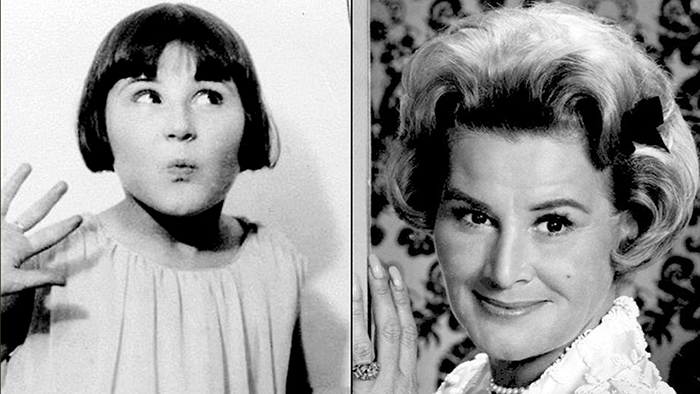
Few entertainers in history enjoyed as long a career as did Rose Marie, born 100 years ago today. Her career began when she was just four years old (known then as Baby Rose Marie, she had a weekly radio program that was broadcast nationally before Shirley Temple was even born), and she went on to enjoy success in vaudeville, radio, records, motion pictures, Broadway, and television.
In 2017, a delightful documentary, Wait for Your Laugh, was released that told the story of her amazing life and career, and we’re delighted to share a very lightly edited transcript of a telephone conversation we had with her shortly after the film’s release. Buckle your seat belts; it’s a delightfully wild ride. As you’ll soon see, even at 94, Rose Marie was as sharp and as funny as ever.
Cladrite Radio: I have a lot of things I’d like to talk to you about.
Rose Marie: First of all, let me ask you a question.
Cladrite Radio: Sure.
Rose Marie: Did you see the movie [Wait for Your Laugh]?
Cladrite Radio: I did!
Rose Marie: What’d you think of it?
Cladrite Radio: I loved it. I thought it was great.
Rose Marie: What’d you like about it?
Cladrite Radio: I’m very interested in the popular culture of the 1920s, ‘30s and ‘40s, in addition to …
Rose Marie: That’s my era.
Cladrite Radio: It sure is. I am involved with an online radio station that features music of that era. We play some of your records on the station.
Rose Marie: Oh, nice.
Cladrite Radio: When I got the chance to interview you, I was so excited. I’m a fan of your music, and I grew up with you on TV as well.
Rose Marie: I know, everybody says that. It makes me feel so old.
Cladrite Radio: Oh, well, I’m not so young myself.
Rose Marie: I’m 94, wanna bet?
Cladrite Radio: You’re doing great. You’re probably doing better at 94 than I am at 59.
Rose Marie: Okay.
Cladrite Radio: I wanted to ask you about the documentary. Whose idea…
Rose Marie: I’m very happy to tell you. I’m very proud of it. I love it. I’m so proud of [director] Jason Wise, I can’t stand it. I think he’s a genius. I think he’s going to be one of the biggest men in the business in a couple years. I think this will introduce him to everybody. I think he’ll even be bigger than Steven Spielberg.
Cladrite Radio: I’ll bet he wouldn’t mind that a bit.
Rose Marie: Oh, he’s wonderful. You have no idea. You don’t know how particular he is. When we decided to do this thing, I kept everything from the time I was three years old. Postcards, pictures, film, anything I had, I kept. When he talked about doing the documentary, he says, “Let’s talk.” I said, “I have everything in scrapbooks. Why don’t you just go through everything?” I emptied out my house, and I mean he cleaned me out of everything. He put it in that documentary. Just a genius.
Cladrite Radio: All the materials that we see in the documentary, the film clips we see and some of the programs and promotional materials and various things that are included in it…
Rose Marie: All mine. All mine that he dug up out of my house.
Cladrite Radio: That’s great. I’m so glad you saved those materials all these years. It really paid off.
Rose Marie: You know something? If I’d known it’d been that great, I’d have paid more attention to it.
Cladrite Radio: Was it Jason’s idea to do the documentary? Did he come to you?
Rose Marie: My daughter, God bless her… I have to tell you something about my daughter. We’re an odd couple, the two of us, because we don’t drink, we don’t smoke, we don’t have any booze. She’s married 38 years. I was married 20 years, before my husband died. No divorces, no two or three marriages. We’re very unusual. Anyway, when I got sick, she decided, “Mother, sit back and enjoy the ride. I’ll take care of everything.” She has been unbelievable. Taking care of everything, bills, this, that, this, that. She’s been just wonderful. People were calling her about doing a documentary. She said, “No, that’s not the guy. It doesn’t hit my guts right. No. No, no, no, no.” Jason called, his wife read my book and said to Jason, “I think you should look into this.” He called, he came over to the house, we sat down and talked. After he left, my daughter said, “He’s the one. He’s the one to do your documentary.” That’s how that happened.
Cladrite Radio: She sounds like just what any mother would hope for in a daughter.
Rose Marie: More than that. God was very good to me, gave me the best one.
Cladrite Radio: How long did it take you to do the documentary, once you decided to undertake it?
Rose Marie: I think it took him, putting it all together, about three years.
Cladrite Radio: Well, it shows on the screen. It was worth it.
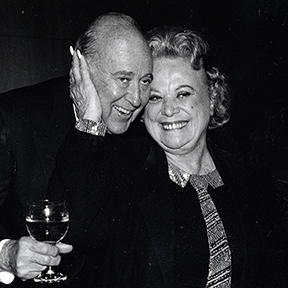 Rose Marie: Even Carl Reiner said, “I’ve never seen anything like this. This is the greatest thing I’ve ever seen.” He was just wonderful.
Rose Marie: Even Carl Reiner said, “I’ve never seen anything like this. This is the greatest thing I’ve ever seen.” He was just wonderful.
Cladrite Radio: Carl Reiner should know. He’s certainly an authority.
Rose Marie: Right, you’re absolutely right. I’m so proud that he feels that way, because he’s going out and he’s working for me. He’s going out and pushing it to everybody. It’s been unbelievable.
Cladrite Radio: You’re very lucky to have so many of the key figures in your career still around. I mean, some of them are no longer with us, but to have Carl Reiner, Dick Van Dyke and Peter Marshall, that’s quite something. They’re all great in the documentary as well.
Rose Marie: Well, I’ve got news for you, I’m losing them one by one. They keep dying off on me. I’m one of these people, once I make a friend, like when I was a kid, all my friends I had until they died. The one that’s in the documentary, Ruthie, we met when we were both 15. Until the day she died, we were very close.
Cladrite Radio: I wondered if she was still with us, but she passed away?
Rose Marie: She passed away. All my girlfriends passed away.
Cladrite Radio: She seemed like a great friend.
Rose Marie: Yeah. I had many. I had a girl in Jersey I grew up with, who lived across the street from me, she just died about a couple of months ago. The one that’s in the documentary, Geri, she died. Her daughter is my godchild. I’ve had them pretty long, I guess. Kept up with every one of them.
Cladrite Radio: That’s wonderful. I’m a little bit like that myself. I’ve had friends say, “Boy, you do a great job of keeping up with everybody.”
Rose Marie: It’s wonderful. It’s a wonderful thing to do.
Cladrite Radio: I think so, too. If they were a blessing to you when you’re young, why wouldn’t they be as the years go by?
Rose Marie: That’s right, that’s absolutely right.
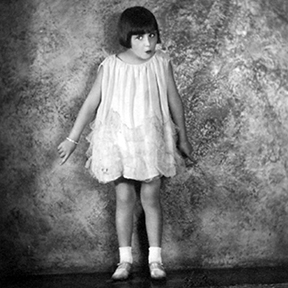 Cladrite Radio: You’re probably best remembered for your years on The Dick Van Dyke Show and Hollywood Squares, and some folks my age and younger may not know what a big star, what a big success you were at such a young age. Talk a little bit about what that was like, to be a star at age four, when you were billed as Baby Rose Marie.
Cladrite Radio: You’re probably best remembered for your years on The Dick Van Dyke Show and Hollywood Squares, and some folks my age and younger may not know what a big star, what a big success you were at such a young age. Talk a little bit about what that was like, to be a star at age four, when you were billed as Baby Rose Marie.
Rose Marie: My mother loved show business. She was a very sweet, wonderful, dumb Polack, but I loved her dearly. She loved me. She always called me her firstborn. We were very close. My family has always been very close. 14th Street, at that time, is the 42nd Street of today in New York. My mother used to take me to see all the shows, the vaudeville, the movies, this and that. I used to come back to the apartment and I would entertain my grandmother and grandfather, and Polacks lived up on the third floor. We were living in a railroad flat. I said, “I’ve got to go sing for the Polacks.” I went upstairs and I sang and did everything that I saw. I’m not an impressionist, I just did it my way, and they thought it was wonderful.
One day, they came to my mother and they said, “We’ve entered her in an amateur contest.” My mother says, “I don’t know whether she’ll do anything in front of people. She does it here at home, but I don’t know whether she’ll do it anyplace else.” They said, “She’ll do it.” They bought the dress that I wore. They bought the Mary Jane shoes, the brocaded Mary Jane shoes. They’re in the Smithsonian, those shoes.
I went to the theater. I’m in an amateur contest, now you’ve got to imagine a four year old kid with this voice that I have, singing What Can I Say Dear After I Say I’m Sorry?, like Sophie Tucker. Naturally, I won.
I ran off the stage into the wings. Somebody threw a bouquet of red roses in one arm. Somebody threw a bouquet in the other arm. I said, “Hold the roses. I can’t take my bow.” I heard the people yelling in the audience, “Bring the kid back. We want the kid to sing. Bring the kid back.” That’s how I made my title of my book, Hold the Roses.
Cladrite Radio: That’s a great title.
Rose Marie: From that, everybody got to know me in New York, like the Elks Club and country clubs and things like that. I used to go and sing over there. NBC had heard about this, excuse me, child wonder. They asked to come up and see them, and they signed me to a contract. NBC was affiliated with RKO across the country. First of all, NBC put me in a radio show. I was five years old. Piano player, an announcer, and me, Sundays at 12:15 p.m., 15 minutes, across the country, coast to coast. The sponsor was Julius Grossman Shoes, which almost killed me, because the show was coast to coast, but they only had one store in New York. I never could understand that.
Cladrite Radio: Yeah, that’s a little strange.
Rose Marie: I think they’re still there. I really think they’re still there. Julius Grossman Shoes. “Good feet deserve them, and bad feet need them.”
Cladrite Radio: I love it.
Rose Marie: I was on the air Sunday mornings, 12:15, and I would do 15 minutes of songs and talk to the announcer and stuff like that. People used to write in and say, “That’s not a child, that’s a 45-year-old midget. No child sings like that. That’s not a child.” All the fan mail came in saying, “She’s not a child.” RKO, as I said, affiliated with RKO, sent me into vaudeville across the country, all the RKO theaters, to prove I was a child. I was across for about a year and played every town in this country that had an RKO theater.
I did vaudeville. Oh, I learned so much in vaudeville. All the guys and people in the shows that I was in, they looked at me as a kid. They said, “Come play with us. Come play.” They taught me how to juggle. They taught me how to do a yo-yo trick. They taught me everything that they did in their act. To the day he died, George Burns used to call me Baby, and Lucille Ball did the same thing. She said, “I can’t call you Rose Marie, you’re a baby.
I became very talented by knowing all these things. Walking on a big ball and doing things like that. Balancing, juggling, things like that. I learned an awful lot, plus the fact that they were so wonderful to me. They said, “She’s a kid, we’ve got to play with her.” The people in the business, as I got older, they always treated me as an adult.”
As I say, it’s been a terrific life. It’s been unbelievable, really.
Cladrite Radio: Did you ever think for a second back then that you might have a 90-year career?
Rose Marie: No, never in a million years.
Cladrite Radio: No, you couldn’t imagine that, could you?
Rose Marie: No. I got sick when I was about 85, 89, something like that. I had a few things happen to me and I can’t walk, but I use a wheelchair. I think I still have my brains.
Cladrite Radio: Yes, you certainly do.
Rose Marie: I do voiceovers. I just did a couple of Garfields, voiceovers.
Cladrite Radio: Right. Yeah, there’s a clip from that in the documentary I think.
Rose Marie: I’m still working.
Cladrite Radio: That’s great, that’s wonderful.
Rose Marie: June Foray, who just passed away, she was 100. She was the queen of the voiceovers.
Cladrite Radio: Yeah, she did Rocky the Flying Squirrel, didn’t she?
Rose Marie: Yeah, we worked together. That’s what I was going to tell you. What a thrill to work with her. We did this Garfield, we both played witches. It was so much fun.
So easy. You don’t have to worry about makeup. You don’t have to worry about getting dressed. You can go in and sit down and there you go.
Cladrite Radio: Well, you’re entitled a little easy money at this point in your life. If it comes easily, it’s fully deserved.
Rose Marie: I tell you something about money, I never made a dime off The Dick Van Dyke Show [reruns]. Everybody thinks I’ve got closets full of money. I don’t. After we did the shows, we got paid for six [re-airings], and that was it. I haven’t received a dime. Every time the show is sold to another network or to another company or something, Dick Van Dyke, Carl Reiner, Danny Thomas and Sheldon Leonard each get a million dollars. We don’t get anything.
Cladrite Radio: That’s rough.
Rose Marie: We don’t get a dime.
Cladrite Radio: You were so key to the show’s success.
Rose Marie: I was happy about it. I was working. I was very happy with the show. I was treated like a queen. It was wonderful.
Cladrite Radio: I know that your father—you can tell me if you feel differently, though I don’t think I’ve got this wrong—that he didn’t play an entirely positive role in your …
Rose Marie: I hated him.
Cladrite Radio: Yes. I thought I’d let you say it, rather than me.
Rose Marie: Is that blunt enough?
Cladrite Radio: That’s blunt enough. That’ll cover it.
Rose Marie: He was a mean, mean man. He treated my mother like dirt. He had another family. He had that family [with two kids]. They were both called the same as my brother and I.
Cladrite Radio: That’s very strange. Not only is it not good and not right, it’s strange.
Rose Marie: I don’t know how the hell he got away with it.
Cladrite Radio: Was he married to your mother?
Rose Marie: No. He wasn’t married to my mother. He was married to this woman in Brooklyn. I only found that out after I came out here [to Southern California] and my cousin told me.
Cladrite Radio: As a child, before you started to have a say in things, did he push you, do you think, harder than he should have?
Rose Marie: He was my manager, this, that. He traveled with me. That’s where the Al Capone story came in.
Cladrite Radio: Right, right.
Rose Marie: Evidently, my father was with the mob years before that, as a guy that goes in and says, “If you don’t join the union, we’ll burn it up.”
Cladrite Radio: He was kind of a fringe mob guy, right?
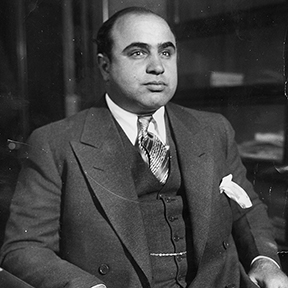 Rose Marie: He was not that important. He was a runaround guy. When we met Al Capone, Al Capone said, “Hello, Happy.” I looked at my father, I said, “Why did he call you that?” He said, “That’s my nickname, Happy Hank.”
Rose Marie: He was not that important. He was a runaround guy. When we met Al Capone, Al Capone said, “Hello, Happy.” I looked at my father, I said, “Why did he call you that?” He said, “That’s my nickname, Happy Hank.”
Cladrite Radio: Did you have any idea when you met Al Capone who he was? Did anyone explain to you who…
Rose Marie: No. I didn’t have a thing. I was at the Palace Theater in Chicago, working with Milton Berle. The doorman said, “There’s a man to see you.” My father and I went out the back door, and there was this man with this big limousine, smoking a cigar. I looked at him and I looked at my father. Al Capone said, “Hello, Happy.” I looked at my father and my father said, “Hello Al, how are you?” He said, “We want the kid over for dinner. All the boys want to meet her. They think she’s wonderful and she’s like a baby. They want to see her and talk to her.”
My father said, “She does four shows a day. I don’t know about the time.” He said, “We’ll get her back in time, but the boys want to see her. We’ll pick you up with a car and bring her back. What time are the shows?” My father told him. He says, “We’ll see you about 4:00.” I went out and said to my father, “Who’s that?” He said, “Never mind.” The doorman said to me, “Do you know who that was?” I said, “No.” He said, “That’s Al Capone.” I said, “Oh my God. I’m going to be picked up with a shovel.”
Cladrite Radio: How old were you at that time?
Rose Marie: About 10 or 11, maybe 9. I was young because he picked me up in his arms.
Cladrite Radio: Right.
Rose Marie: Next day, the limo was there. The doorman said, “Mr. Capone is here.” I said, “Okay.” We went into the limo, we went to Cicero, which is the outskirts of Chicago. Went to this house that had stoops in front of it, which I had never seen before. We went inside and there was this living room, dining room, whatever you want to call it, with this long table and about 20 guys sitting around it. Each one a mob guy with names you wouldn’t believe.
Cladrite Radio: I can only imagine.
Rose Marie: You wouldn’t believe. They all came up to me and said, “We love you, Baby. We think you’re wonderful. We’re going to take care of you.” Al Capone picked me up in his arms and he said, “From now on you call me Uncle Al.” I said, “Sure. ” You know, why not? It was Uncle Al. He held me in his arms, gave me a dinner ring as a present, and he told my father, “If you need anything or want anything, you come to us. We’ll look out for her. Don’t worry. If anybody causes you any trouble or anything, you refer them to us. We’ll take care of it. Don’t worry about it.” Then back I went to the theater.
Cladrite Radio: Wow. That’s pretty crazy.
Rose Marie: I met his wife, but I don’t think she ever said, “Call me Aunt.”
Cladrite Radio: Maybe she wasn’t as big a fan.
Rose Marie: Maybe. [laughs]
Cladrite Radio: Did you ever feel, either as a child or maybe in years looking back … I hope you feel that your childhood as a performer was wonderful, but did you ever feel that maybe you missed out a little bit on childhood’s simple pleasures?
Rose Marie: Didn’t miss out a thing. Didn’t miss out a thing. Traveled.
Cladrite Radio: You wouldn’t change it, huh?
Rose Marie: No, not a bit. Traveled all over the country. I went to places that I learned about in school.
Cladrite Radio: Right.
Rose Marie: The Alamo, I sang at the Alamo. I did everything that anybody would give their right arm for. I met some wonderful people along the way. Sheriffs of different towns. One sheriff in Fort Worth gave me a pearl-handled little gun. Things like that. I had a hell of a time.
Cladrite Radio: Good. I’m glad to hear that you feel that way. Some people have a little bit of bad feeling about it, being a child star. Dickie Moore felt that way a little bit.
Rose Marie: No, I never felt that way. I was never pushed. I always loved what I did. I was very happy to do it. Nobody pushed me, even my father. When the time came [that he objected to] my husband was the only time I said to my father, “Go to hell.”
Cladrite Radio: He didn’t want you to marry him, huh?
Rose Marie: Yeah. He was afraid somebody else was going to take the money. He made all the money. My mother didn’t get a dime.
Cladrite Radio: That’s awful.
Rose Marie: I must have made millions as a kid.
Cladrite Radio: It sure sounds like it.
Rose Marie: So I don’t know. But what the hell? Maybe I wouldn’t be the woman I am today.
Cladrite Radio: Well, that’s true. Our experiences make us who we are, don’t they?
Rose Marie: That’s right.
Cladrite Radio: You’ve been in show business your entire life, but if you hadn’t been, have you ever thought about what you might have done had you gone a different route?
Rose Marie: Gee, not really.
Cladrite Radio: No?
Rose Marie: I don’t think I’d do anything.
Cladrite Radio: You would have found something if show business hadn’t been there for you.
Rose Marie: I don’t know. I really don’t know. I can’t answer that, I’m sorry.
Cladrite Radio: That’s okay. I’m kind of proud to stump you. That means maybe you haven’t been asked that question too often.
Rose Marie: No, I haven’t. That’s all I knew. I didn’t even think about anything else.
Cladrite Radio: There you go. You were happy doing it.
Rose Marie: I loved it. I loved it. To this day, I love it.
My daughter saw me perform at Westbury, when I was with Four Girls Four [a popular revue that toured in the late 1970s and early ‘80s that featured Rose Marie, Margaret Whiting, Helen O’Connell and Rosemary Clooney]. She turned to Margaret [Whiting], who was in the show—[they were] in the wings watching me perform, and my daughter turned to her and said, “She really loves it, doesn’t she?” Margaret said, “She sure does.”
Cladrite Radio: That must have been a very fun tour to do.
Rose Marie: Oh, that was a fabulous show, absolutely fabulous.
Cladrite Radio: You were selling out big houses, weren’t you?
Rose Marie: Oh, every place two and three times. We played the same places two and three times. We made all the circuits, all the in-the-rounds and summer theaters in-the-rounds, and things like that. It was a big, big [success] … Even today, it’s one of the greatest shows you’ve ever seen.
Cladrite Radio: I wish I could have seen it myself.
Rose Marie: I wish I had a film on it. I never took it. I wish I did.
Cladrite Radio: That would have made a great documentary, that tour. It’s a shame that didn’t happen. I got to serve Margaret Whiting a hamburger one time, back in my waiter days. She seemed pleased that someone younger knew who she was and was excited to be serving her.
Rose Marie: She was a hell of a gal, I’ll tell you that.
Cladrite Radio: She seemed like it. She seemed very nice. Kind of on the quiet side when I dealt with her, but very nice, very pleasant to deal with.
Rose Marie: She also loved the business. I used to call her Miss Show Business.
Cladrite Radio: Yeah, she grew up in show business in a sense, right? Her father, Richard Whiting, was a songwriter.
Rose Marie: Because of her father, yeah. Johnny Mercer, she was very close to Johnny Mercer, who I got to be very close with when I came out west.
Cladrite Radio: What a talent he was.
Rose Marie: What a talent. He did music and lyrics to Top Banana, [a Broadway show] that I was in.
Cladrite Radio: Oh right, with Phil Silvers.
Rose Marie: Yeah.
Cladrite Radio: Was that your first time to work on Broadway?
Rose Marie: No, I did Ziegfeld Follies with Milton Berle.
Cladrite Radio: I’m glad you mentioned that, because I don’t think I knew that.
Rose Marie: I did that and I did Springtime in Brazil with Milton, also, which never opened on Broadway, but we played Philadelphia and Pittsburgh and someplace else. Then I did Fun City with, excuse the expression, Joan Rivers. I did about three or four shows on Broadway.
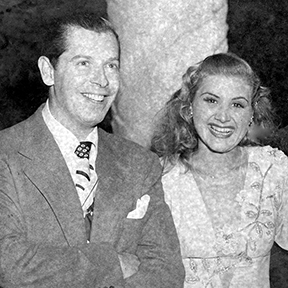 Cladrite Radio: How was Milton Berle to work with?
Cladrite Radio: How was Milton Berle to work with?
Rose Marie: Absolutely fabulous. I knew Milton from the time I was four years old. He used to go round telling everybody, “I saw Rose Marie without her top.” Because I was five years old when we worked the Steel Pier in Atlantic City, and I was in the ocean all the time.
Cladrite Radio: That’s funny.
Rose Marie: That’s it, I was five years old. He said, “I saw her without a top.”
Cladrite Radio: For those of us who are interested in that era, the Steel Pier’s kind of legendary. I never got to see it, but it must have been quite a place.
Rose Marie: The Steel Pier was unbelievable.
Cladrite Radio: Yeah, we hear about it, but I never got to go there. I didn’t move to New York till the eighties.
Rose Marie: They had diving horses.
Cladrite Radio: That’s exactly what I wanted to ask you, if you got to see the diving horse.
Rose Marie: Oh, of course. By the way, we did so much business, they made a postcard out of it, with Milton holding me in his arms, and they made a postcard. You can buy the postcard in Atlantic City.
Cladrite Radio: Oh, that’s great. That must have been a lot of fun to work in Atlantic City in those days.
Rose Marie: Milton was wonderful to me. As I say, I’ve known him all my life practically. He used to write material for me. I was the only one that could say, “Shut up, Milton.” You know? I did his show many times, the Texaco thing, many times.
Cladrite Radio: Right. Earlier, you said you weren’t really an impressionist, but you do do an impression of Jimmy Durante.
Rose Marie: That happened quite accidentally.
Cladrite Radio: How so?
Rose Marie: I’m not an impressionist, you’re right. I’m not an impressionist. Somehow, being very friendly with Jimmy and Marge, I used to go up there, talk to them and everything. I loved the way Jimmy did everything. One night in the show, I did a little impression of him. Everybody said, “You should leave that in. That’s very good.” Marge, Jimmy’s wife, used to say, “You do the best Durante of anybody!”
I would do a little bit of Durante. Then it got to be such a thing that I had to do a whole number on Durante. I used to have material written for me like, I’m in Love With Jimmy Durante, what else? Who Will Be With You When I’m Far Away Durante. I had a whole number written because every time I played someplace, I had to have a whole new Durante number. It became a very important part of my act.
Cladrite Radio: That’s great. Did you still do that when you performed in Vegas with him?
Rose Marie: Yes. First of all, to work with him was the biggest thrill of my life. The show was Xavier Cugat and Tommy Wonder was a dancer and me and Jimmy. So Xavier Cugat would open the shoe with Abbe Lane, and then Tommy Wonder would come out and do his dance. Then I would come out and do my act. Then Jimmy would come out. Towards the end of his act, I used to run out on stage and do my Durante. He’d say, “Wait a minute, wait a minute. There’s an imposter here and I don’t know who it is.”
Then the two of us did Durante and we did the walk-off together. It was unbelievable. It would be sensational today.
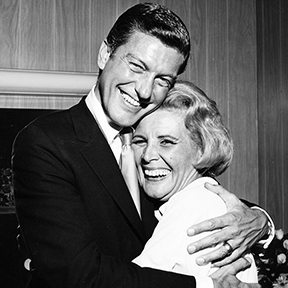 Cladrite Radio: It sounds like great fun. Probably the thing you’re most closely associated with in the minds of many people is The Dick Van Dyke Show.
Cladrite Radio: It sounds like great fun. Probably the thing you’re most closely associated with in the minds of many people is The Dick Van Dyke Show.
Rose Marie: Yeah, I guess so.
Cladrite Radio: So many other things too, of course, but that show just has such an ongoing life on TV. It’s a shame that you don’t get to benefit from it. I don’t like hearing that one bit.
Rose Marie: No, not a dime. Not a dime.
Cladrite Radio: Aside from that, has he been a good friend to you over the years? Have you stayed in touch?
Rose Marie: Oh yes. Oh, of course. In fact, he’s one of the people [who’s in] the documentary.
Cladrite Radio: Oh yeah, he’s in it quite a bit. It’s great to see him.
Rose Marie: Him and Carl Reiner both, and Peter Marshall, who I’ve known since I’ve been five years old, he’s talking for me. He’s another one up there that’s just fabulous. I’ve worked with Peter and we did Squares together for 14 years.
Cladrite Radio: You were a real mainstay on that program.
Rose Marie: Yeah, yeah.
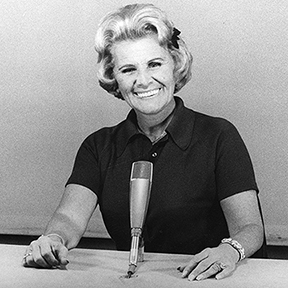 Cladrite Radio: Was that a fun show to do?
Cladrite Radio: Was that a fun show to do?
Rose Marie: Very much so. Everybody thinks we were told the questions and the answers—no, we weren’t. Because The $64,000 Question show was just found out to be a fraud, and so everybody was worried. We couldn’t even talk to the contestants as we were in the hall. We weren’t allowed to talk to anybody. We never knew the questions, and the answers came from us.
Cladrite Radio: There weren’t any pre-written joke answers given to you?
Rose Marie: No.
Cladrite Radio: Oh, I’d certainly heard otherwise. That’s surprising and good to hear.
Rose Marie: We didn’t know the questions until Peter asked them.
Cladrite Radio: It was interesting, I learned recently that he just kind of stumbled into doing Hollywood Squares. He was going to turn it down, but he heard that Dan Rowan was going to get it if he didn’t, and he wasn’t very fond of Dan Rowan, so he took the job out of spite.
Rose Marie: [laughs]
Cladrite Radio: You can ask Peter next time you see him if that’s true. That’s what he said on a documentary I watched recently, a different one than yours. I thought that was kind of funny, because he seems like such a nice guy, not a spiteful type at all.
Rose Marie: Peter’s the most wonderful man in the world.
Cladrite Radio: Well, I guess we all have our spiteful moments.
Rose Marie: As he says of me, he says, “Rose Marie is wonderful, but don’t get her mad.”
Cladrite Radio: You’re from the New York area, so you’re tough.
Rose Marie: That’s right.
Cladrite Radio: You have to be tough to grow up here.
Rose Marie: Listen, on the Van Dyke show, I was the first women’s libber, so that’s how tough I was.
Cladrite Radio: Oh yeah, it was great that they had a female comedy writer on the show, but probably somewhat unusual for the time.
Rose Marie: Well, that’s right. I was making the same money as they were, and I was working with two men all the time. It was a women’s libber for me.
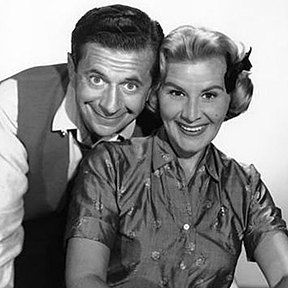 Cladrite Radio: That’s great. You were the one who recommended Morey Amsterdam for that role, right?
Cladrite Radio: That’s great. You were the one who recommended Morey Amsterdam for that role, right?
Rose Marie: Yes. Morey and I had been friends since I’d been 10 years old. Morey used to write all my material. Morey was known as the joke machine. He would make up jokes. He was very funny as a writer. Everybody knew him in the business, but nobody knew him in the world. They just knew him in the business. When I went up for the show—that happened where I’d been working in Vegas—and Sheldon Leonard and Danny [Thomas]—I’d known Danny for years, I opened for him at the Martinique in New York. From that, we became very good friends.
They used to come and visit me when I played Vegas. Sheldon used to say to me, “Don’t you ever bomb?” I said, “Not if I can help it!” I said to Danny, I said, “Geez, we’re such good friends, how come I don’t do your show Make Room for Daddy? Give me a guest shot, come on.” Danny would say, “Your time will come. Your time will come.” I said, “Okay.”
One day I get a call from a casting office saying, “Go down to Desilu and Danny Thomas.” I said, “It finally happened.” She says, “No, this is not for The Danny Thomas Show. This is for a new show called The Dick Van Dyke Show.” I said, “What’s a Dick Van Dyke?” She says, “Go on down, you’ll find out.” I went down. I didn’t have to read. I didn’t have to do an audition. I didn’t have to do anything. Sheldon turned to Carl [Reiner]—that’s when I met Carl—he said to Carl, “You want the best, get Rose Marie.” Carl said, “Fine with me.” That’s how I got the job.
I said, “Who have you got for the third writer?” They said, “We haven’t picked him yet.” I said, “What about Morey Amsterdam? He’s a joke writer. Everybody knows him as a joke writer. He’s funny.” He said, “Do you have his number?” I said, “Yeah. He lives in Yonkers.” He says, “All right.” I gave him the number. I came home and I called him up, I said, “They’re going to call you for a new show. You’re going to come out to California. It’s called The Dick Van Dyke Show.” He says, “What’s a Dick Van Dyke?” I said, “We’ll both find out when we get there.” That’s how Morey got the job. He never auditioned either. They took him sight unseen.
Cladrite Radio: You can’t ask for better than that, getting a gig without having to audition for it.
Rose Marie: I think the chemistry of that whole cast was absolutely perfect.
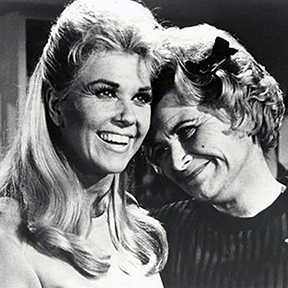 Cladrite Radio: You also worked with Doris Day for a couple of seasons on her show.
Cladrite Radio: You also worked with Doris Day for a couple of seasons on her show.
Rose Marie: Sweetest woman in the world.
Cladrite Radio: She’s still going strong too.
Rose Marie: The way you see her and know her is the way she is, really. She’s the sweetest thing in the world. It was a pleasure working with her. We had a lot of fun. She used to say I made her laugh. We would tease one another. She calls me and I call her about once a month. We’re very good friends.
Cladrite Radio: I wanted to ask you, if you don’t mind, a little bit about your personal longevity, as opposed to the professional, which we’ve talked about some. Does living so long—I know there are many wonderful things about it, but does it carry with it any particular challenges?
Rose Marie: It’s hard being older and losing all your friends little by little. I keep saying, “There’ll be nobody left for my funeral.” All my friends, who I grew up with all these years, I kept sending presents from the time I was 15 and 16 years old, to the day they died. I keep busy. I do a lot of writing myself. I’m thinking of writing another book.
Cladrite Radio: I think you should.
Rose Marie: Things like that. I watch a lot of television. I’m very mixed up with politics right now. I sit and I argue with the television.
Cladrite Radio: I do a bit of that myself.
Rose Marie: I keep very busy and I keep in touch with my friends. I still send birthday cards, anniversary cards, and things like that. I keep up my life as best I can.
Cladrite Radio: Do you have any advice for people who are younger but who might end up living a long life like yours? Of course, none of us knows how long we have, but do you have any advice for somebody who may be wondering about a long life?
Rose Marie: Just tell them to enjoy everything, because if they didn’t enjoy it, they’ll never know the end of it.
Cladrite Radio: That’s good advice.
Rose Marie: Just like I say, if I’d have known it was all going to be that good, I’d have paid more attention to it. Life is one day after the other. You take one after the other as it comes, and you make the best of what it is. If you can change it, you change it. If you don’t want to change it, you don’t change it. As you get older, you have your own mind to fill and own mind to be satisfied. I’m very happy that I wound up like this in my old age. I don’t think it could be any better.
That’s thanks to my daughter. I have to give thanks to my daughter. She has just taken over everything. She is taking care of me. She’s been married 38 years, trying to keep up with her marriage. We’ve been very lucky and very happy.
Cladrite Radio: That’s wonderful. Family is the key, isn’t it?
Rose Marie: Oh it sure is, it sure is.
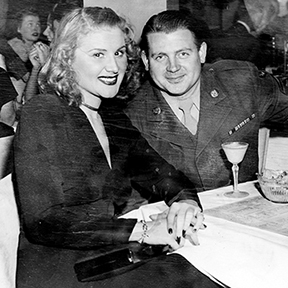 Cladrite Radio: Let’s talk about your husband, trumpeter Bobby Guy, who sadly was lost to you way too young.
Cladrite Radio: Let’s talk about your husband, trumpeter Bobby Guy, who sadly was lost to you way too young.
Rose Marie: Yeah, only 48.
Cladrite Radio: It sure seems as if you guys had a wonderful time together and were so well-matched.
Rose Marie: It sounds like a joke, but he was my soulmate. He really was. Three days after I met him, I said, “That’s the man I’m going to marry.” They said, “But you don’t know anything about him.” I said, “I don’t care. That’s the man I’m going to marry.”
My girlfriend Geri, who’s in the documentary, she said to me, “You’re going to marry that fat sergeant?” I said, “He’s not a fat sergeant. He’s stuffy, but he’s good.” I said, “I’m going to marry him.” She says, “I can’t believe you, that doesn’t want to go on double dates, you meet somebody and three days later, you’re going to marry him?” I said, “That’s right.” She helped me elope.
Cladrite Radio: That’s a good friend.
Rose Marie: I know.
Cladrite Radio: Did you ever consider marrying again?
Rose Marie: No.
Cladrite Radio: No, you knew that was the one.
Rose Marie: I always felt that was my marriage. To this day, I still think I’m married to him.
Cladrite Radio: You are. In a very real sense, you are. Was it difficult, I know just grieving over a loss like that is painful …
Rose Marie: I have a lot of friends. I went out with a lot of people. I went out with Vincent Price and people like that and had a wonderful time.
Cladrite Radio: What was Vincent Price like?
Rose Marie: Fantastic. When we did Squares together, people used to say to him, “Why does she wear that bow [in her hair] all the time?” Vince says, “Because it’s nailed in her head.”
Cladrite Radio: I’ve heard that the bow that you wear is a tribute to your late husband, is that correct?
Rose Marie: To a degree. It’s bigger than that.
Cladrite Radio: It’s something private you’d rather not talk about?
Rose Marie: Yes, if you don’t mind.
Cladrite Radio: No, of course not. You have very large followings on both Twitter and Facebook. I’m wondering how you came to embrace social media, and do you enjoy it?
Rose Marie: Very much so. I love it. I love what people say. I get so taken away by what people say about me. It’s wonderful. So many thousands said this, and so many hundreds said that.
Cladrite Radio: It’s kind of nice. We’re all fans of performers and writers and so forth, but until recently, you didn’t really have any way, unless you entered that field yourself and you achieved some success, you didn’t have any way to interact with them. Social media’s really kind of nice, to be able to send a note to somebody you admire and care about, and have them see it and respond, it’s kind of special.
Rose Marie: That’s very nice. You’re right. It’s very nice.
Cladrite Radio: I know your fans enjoy the fact that you’re so active there. They know that whatever they say, whatever thanks they offer or appreciation they offer is heard. That’s a real treat.
Rose Marie: That’s sweet, thank you.
Cladrite Radio: Are there any young stars of today that you think have the potential for a career as varied and maybe as long as yours has turned out to be?
Rose Marie: No.
Cladrite Radio: No?
Rose Marie: I haven’t seen one. You know, I want to tell you something. In all the years I’ve been in the business, everybody I worked with and everybody I knew, nobody ever said “hell” or “damn.” Morey, in all his life, never said “hell” or “damn.” Now, they go out, and they say four-letter words.
Cladrite Radio: It’s a very different world in that sense, isn’t it?
Rose Marie: Everybody laughs. Morey said to me, “That’s not funny. Using dirty words is not funny. That’s shock value. You don’t need that to be funny. If you’re funny, you’re funny.” I learned that from him. All the people today, all they do is four-letter words, shake their ass, shake their tops, take their tops off, show their behinds. That’s not talent. Nobody sings. Everybody yells. You can’t understand the words. You don’t know how the melody goes, because they don’t sing the melody, they scream. I can’t find anybody that I like today, not one.
Cladrite Radio: Did you ever work with Nat “King” Cole?
Rose Marie: I met him, I never worked with him.
Cladrite Radio: What was your impression of him?
Rose Marie: He was one of the best. One of the best. They don’t sing like that anymore.
Cladrite Radio: This is kind of an obscure question, and I hope you don’t mind me asking a couple of these “Did you ever meet,” questions. I’m a big fan of Annette Hanshaw, who was a very popular radio singer in the late twenties and early thirties. Does that name ring a bell? Did you ever meet her?
Rose Marie: That name sounds very familiar.
Cladrite Radio: Yes, she was really big in the late twenties and thirties. Then she retired very early. She was not comfortable with live performing. On the radio, she was a big hit in that era. I just thought since you were on the radio around the same time…
Rose Marie: Do you know when I was a child, the radio column in The New York News had a contest, Rudy Vallée was the king, Ruth Etting was the queen, and I was the princess.
Cladrite Radio: You’re in pretty good company there.
Rose Marie: Yeah.
Cladrite Radio: Rudy Vallée was kind of an interesting character.
Rose Marie: I did his show many times.
Cladrite Radio: I read his autobiography, which he wrote when he was still in his twenties.
Rose Marie: We used to do his radio show in the cellar of the Paramount Theater in Brooklyn. The first thing I did when I came out here was Rudy’s show again. I did it out here with him.
Cladrite Radio: That was like old home week. Was he fun to work with?
Rose Marie: He was a dear man, very dear, very sweet. I was very lucky, really I was. I worked with wonderful people who treated me beautifully.
Cladrite Radio: Was there anyone in the business—and you don’t have to give me any names if you don’t wish—but was there anyone in the business that you didn’t really get along with or you found difficult?
Rose Marie: Well, of course, the producer of Top Banana, you know that story. [As seen in the documentary, after she spurned his romantic advances, the producer of the movie version of Top Banana saw to it that most of Rose Marie’s footage ended up on the cutting room floor] That’s about the only one that I can think of.
Cladrite Radio: Most of the people you worked with directly—the performers—you enjoyed? There were no problems?
Rose Marie: Never, no, never.
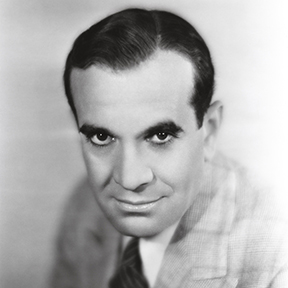 Cladrite Radio: I have to say it did sound like there was one person you didn’t think was so nice, and that was Al Jolson.
Cladrite Radio: I have to say it did sound like there was one person you didn’t think was so nice, and that was Al Jolson.
Rose Marie: He was mean.
Cladrite Radio: But you didn’t deal with him too much, did you?
Rose Marie: He was mean. It was at the opening of The Jazz Singer at the Winter Garden. My short [Baby Rose Marie the Child Wonder] was there—mine was with sound, and his movie was silent and part sound.
Cladrite Radio: Yeah, it wasn’t really a talkie, but that’s how they sold it, wasn’t it?
Rose Marie: Yeah. After it was over, I went over to him, I said, “Mr. Jolson, I thought you were just wonderful.” He said, “Get away from me, you little runt.” I think there was some sort of a show in the theater, and he said to me, “Go out there and tell them they haven’t heard anything yet.” I said, “Okay.”
Cladrite Radio: Thank you so much for your time. It’s been a pleasure talking with you.
Rose Marie: It’s been a long time, I’ll tell you that.
Cladrite Radio: I’m sorry, I hope I haven’t tied you up too long.
Rose Marie: That’s all right. Thank you so much for calling.
Cladrite Radio: Thank you!
Rose Marie: Bye, bye.


Thank you very much for this piece! I absolutely adore watching Rose Marie on the Dick Van Dyke Show. She’s always such a joy to watch.